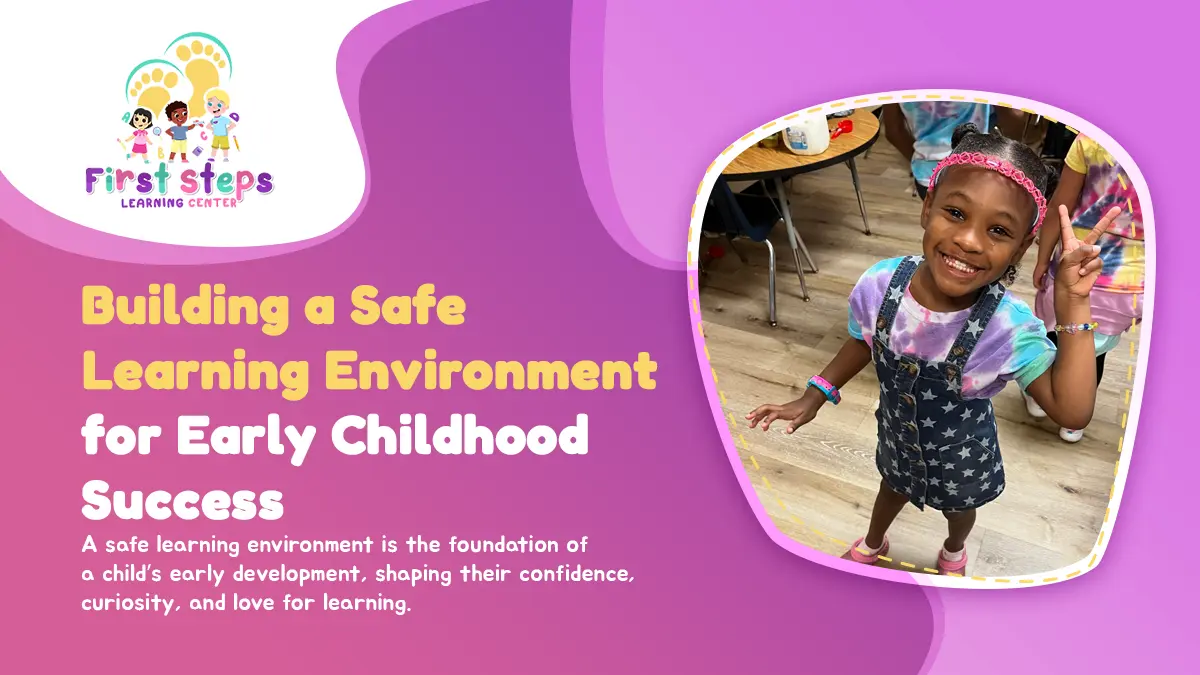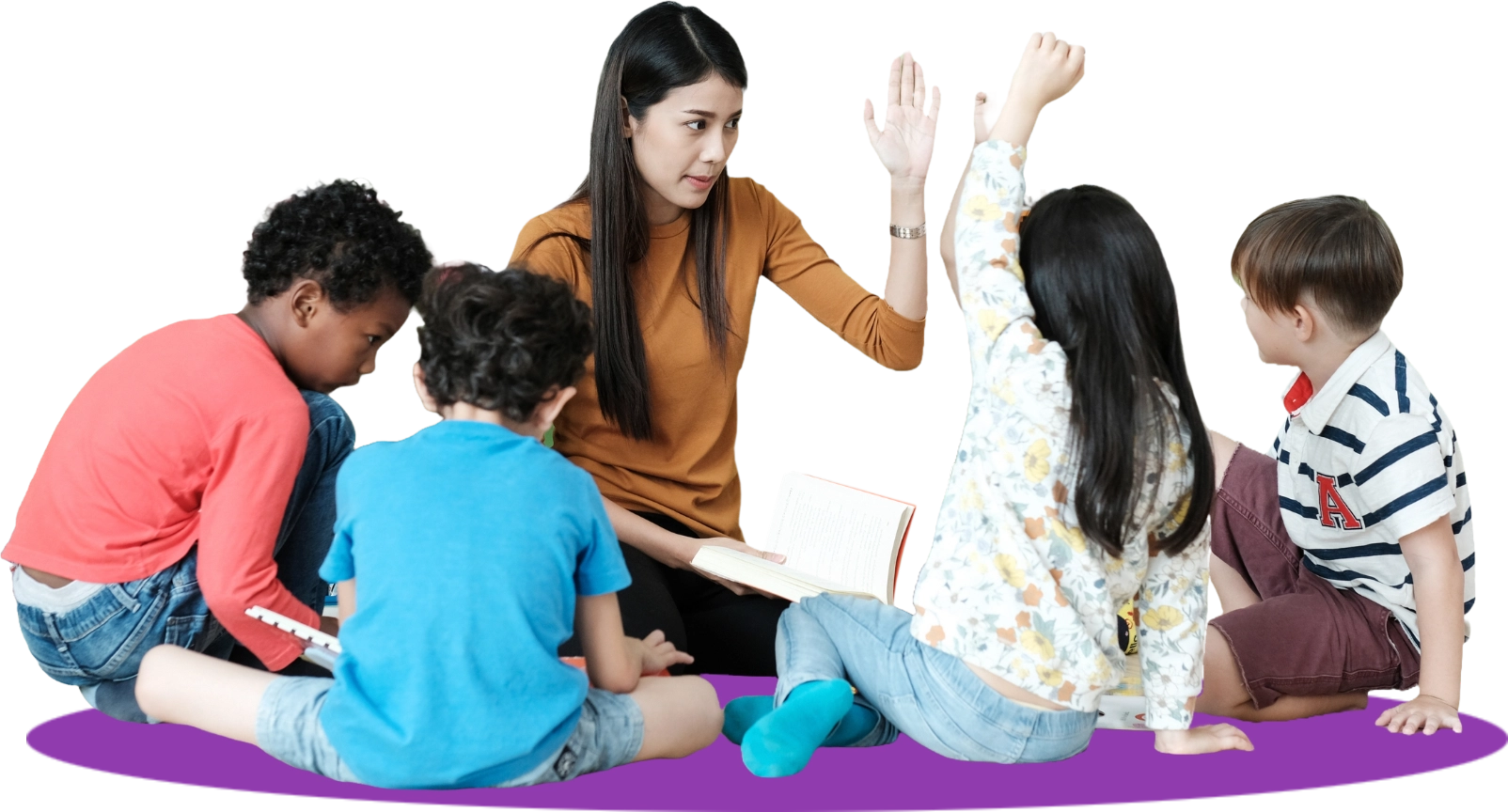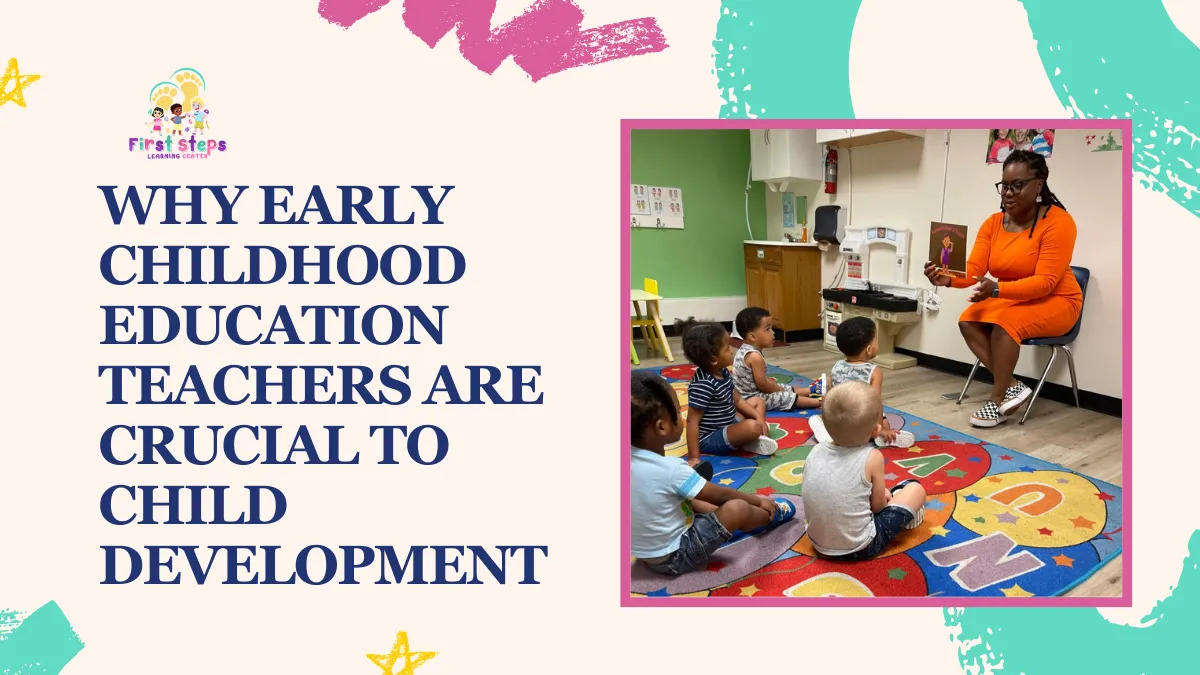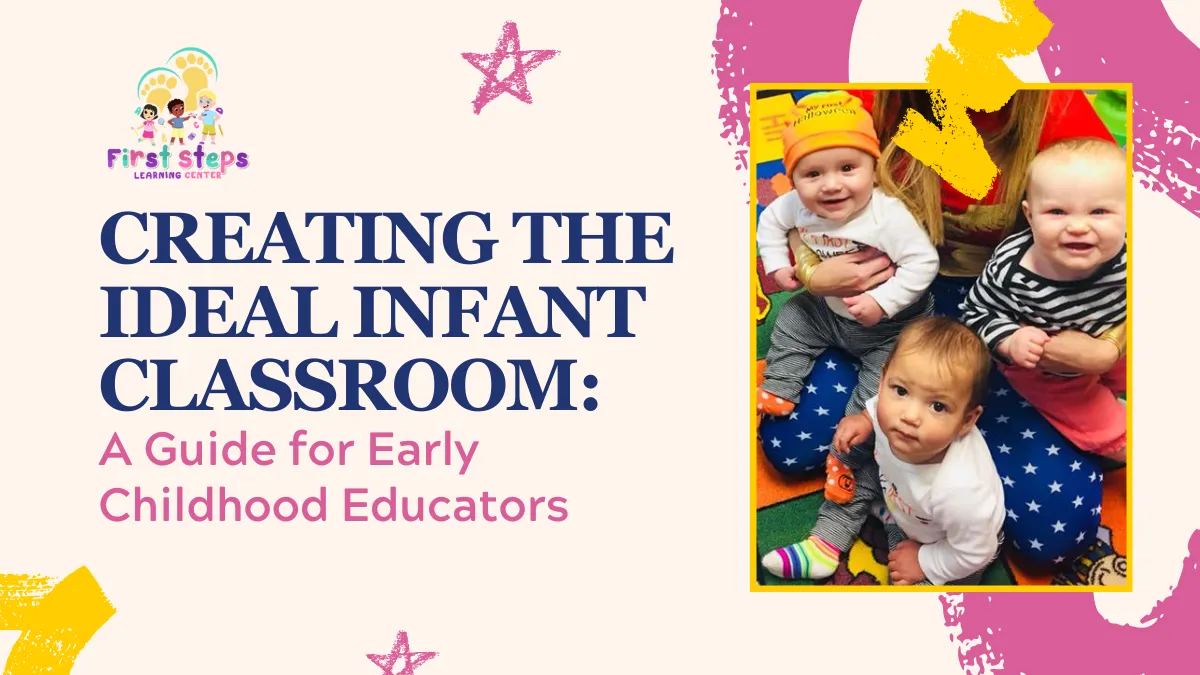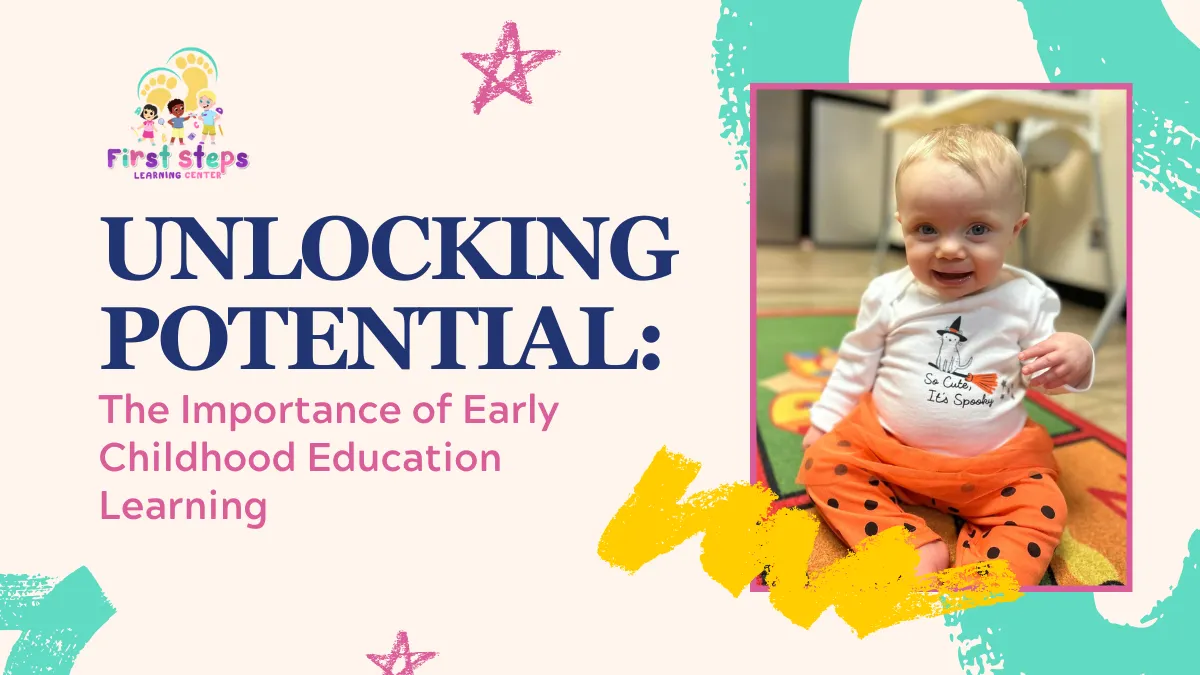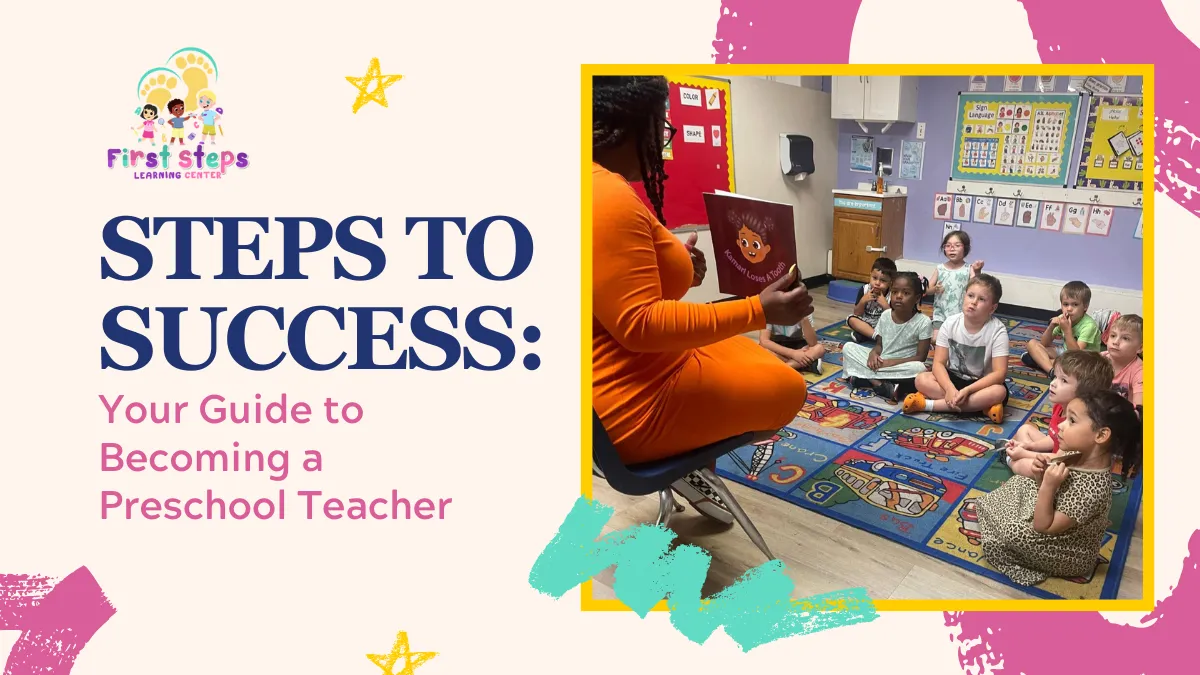A safe learning environment is the foundation of a child’s early development, shaping their confidence, curiosity, and love for learning. At First Steps Learning Center, we understand that young minds thrive when they feel secure, supported, and encouraged to explore the world around them. By fostering a space where children feel emotionally and physically safe, we create the perfect setting for meaningful growth and discovery.
We ensure every child can build essential skills at their own pace through nurturing relationships, engaging activities, and structured yet flexible learning experiences. Our dedicated teachers provide gentle guidance, allowing children to express themselves, solve problems, and develop independence in a warm and welcoming atmosphere. When children feel safe, they become eager learners, setting the stage for success.
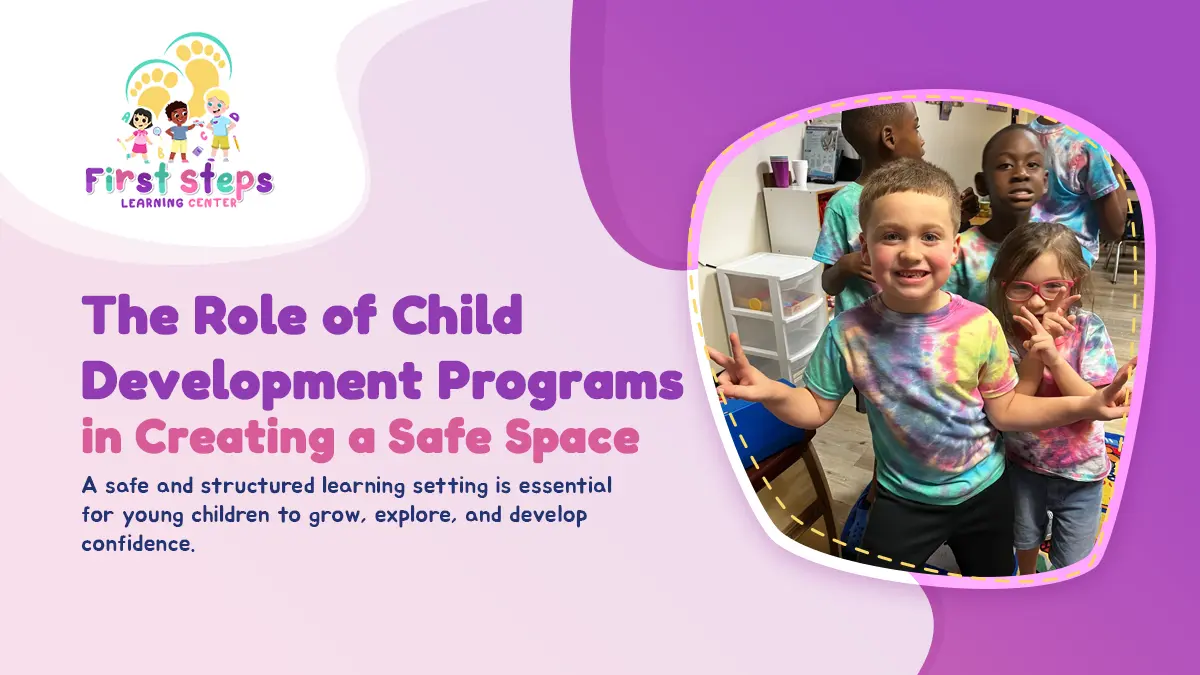 A safe and structured learning setting is essential for young children to grow, explore, and develop confidence. Child development programs provide the foundation for this environment by fostering emotional security, social development, and skill-building in a supportive space. Through intentional teaching methods and nurturing interactions, these programs help children feel safe and encouraged as they learn.
A safe and structured learning setting is essential for young children to grow, explore, and develop confidence. Child development programs provide the foundation for this environment by fostering emotional security, social development, and skill-building in a supportive space. Through intentional teaching methods and nurturing interactions, these programs help children feel safe and encouraged as they learn.
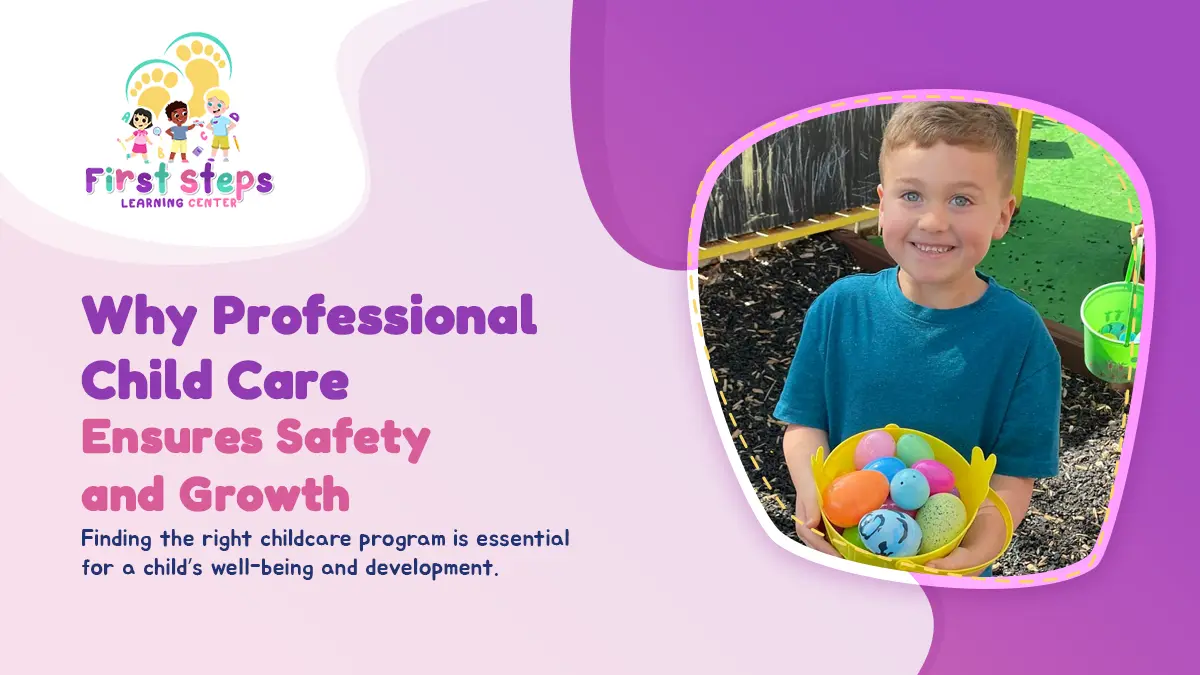 Finding the right childcare program is essential for a child’s well-being and development. Professional child care offers more than just supervision—it provides a nurturing space where children feel safe, supported, and encouraged to grow. With trained educators, structured learning experiences, and a focus on safety, professional childcare centers help children build essential skills while giving parents peace of mind.
Finding the right childcare program is essential for a child’s well-being and development. Professional child care offers more than just supervision—it provides a nurturing space where children feel safe, supported, and encouraged to grow. With trained educators, structured learning experiences, and a focus on safety, professional childcare centers help children build essential skills while giving parents peace of mind.
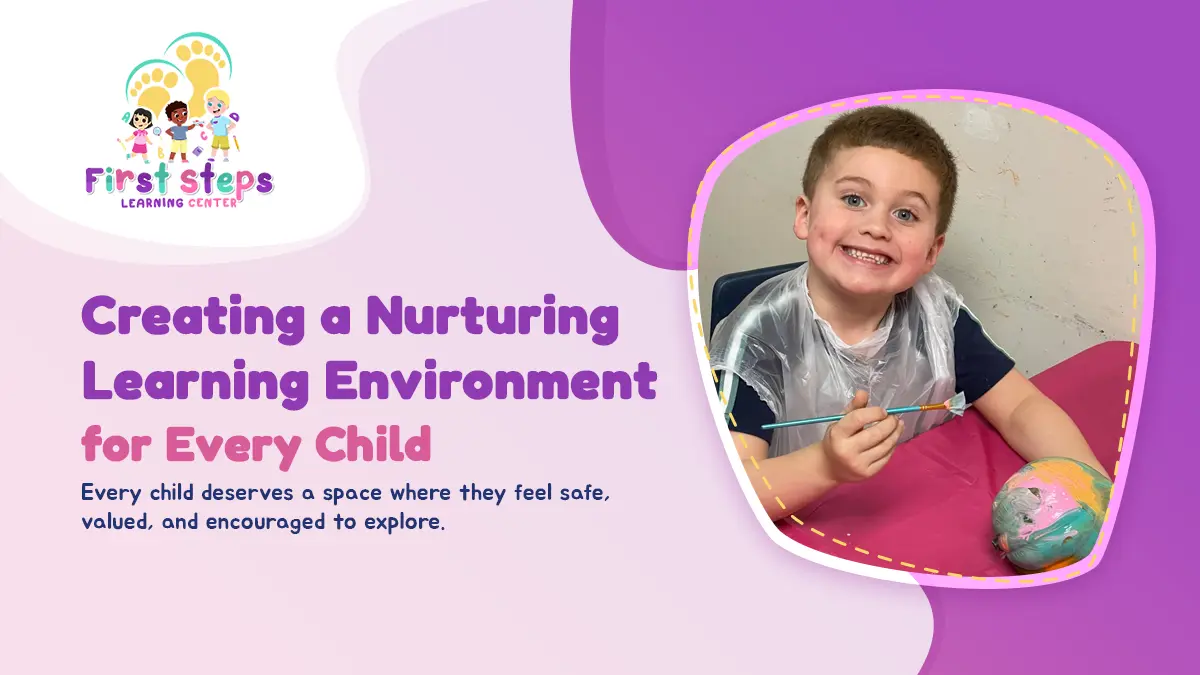 Every child deserves a space where they feel safe, valued, and encouraged to explore. A nurturing learning environment goes beyond academics—it fosters emotional security, social connections, and a love for discovery. Through thoughtful classroom design, supportive teacher interactions, and engaging learning experiences, children can develop the confidence and skills they need to thrive.
Every child deserves a space where they feel safe, valued, and encouraged to explore. A nurturing learning environment goes beyond academics—it fosters emotional security, social connections, and a love for discovery. Through thoughtful classroom design, supportive teacher interactions, and engaging learning experiences, children can develop the confidence and skills they need to thrive.
The Role of Child Development Programs in Creating a Safe Space
 A safe and structured learning setting is essential for young children to grow, explore, and develop confidence. Child development programs provide the foundation for this environment by fostering emotional security, social development, and skill-building in a supportive space. Through intentional teaching methods and nurturing interactions, these programs help children feel safe and encouraged as they learn.
A safe and structured learning setting is essential for young children to grow, explore, and develop confidence. Child development programs provide the foundation for this environment by fostering emotional security, social development, and skill-building in a supportive space. Through intentional teaching methods and nurturing interactions, these programs help children feel safe and encouraged as they learn.
Structured Learning: Creating a Sense of Security
Children thrive when they have clear expectations and consistent routines. Well-designed child development programs incorporate structured learning experiences that provide stability while keeping activities engaging and developmentally appropriate.- Daily schedules: Predictable routines help children feel secure and comprehend what to expect throughout the day.
- Interactive activities: Hands-on learning experiences encourage exploration and active participation.
- Guided transitions: Smooth transitions between activities minimize anxiety and help maintain focus.
Emotional Support: Building Confidence Through Positive Relationships
Feeling emotionally secure is as important as physical safety in a learning environment. Strong relationships with teachers and caregivers help children feel valued and supported, which boosts their confidence and willingness to participate.- Encouraging communication: Open dialogue with teachers allows children to express their feelings and ask questions.
- Gentle reassurance: Comforting words and gestures help ease anxiety and build trust.
- Positive reinforcement: Praise and recognition motivate children to try new things and overcome challenges.
Social Development: Learning Through Interaction
Early childhood is a crucial time for developing social skills. Child development programs provide structured opportunities for children to interact, collaborate, and develop friendships in a safe setting. Children learn to communicate effectively through group activities and guided play and develop empathy for others.- Team-based tasks: Working together teaches cooperation, patience, and problem-solving.
- Turn-taking games: Learning to wait and share helps develop self-control and fairness.
- Conflict resolution: Guided discussions help children understand emotions and find peaceful solutions.
Safe Exploration: Encouraging Independence While Maintaining Security
Children are naturally curious, and providing them with a secure space to explore fosters independence and confidence. Child development programs strike a balance between allowing children to discover new things on their own while ensuring their safety.- Supervised play areas: Carefully designed spaces encourage exploration while minimizing hazards.
- Age-appropriate materials: Learning tools and toys are selected to match developmental needs.
- Encouraging self-help skills: Simple tasks like putting on shoes or cleaning up build independence.
Why Professional Child Care Ensures Safety and Growth
 Finding the right childcare program is essential for a child’s well-being and development. Professional child care offers more than just supervision—it provides a nurturing space where children feel safe, supported, and encouraged to grow. With trained educators, structured learning experiences, and a focus on safety, professional childcare centers help children build essential skills while giving parents peace of mind.
Finding the right childcare program is essential for a child’s well-being and development. Professional child care offers more than just supervision—it provides a nurturing space where children feel safe, supported, and encouraged to grow. With trained educators, structured learning experiences, and a focus on safety, professional childcare centers help children build essential skills while giving parents peace of mind.
Trained Educators: Experts in Early Childhood Development
The quality of childcare largely depends on the expertise and dedication of its educators. Professional childcare centers employ trained staff who understand child development and know how to create a secure and engaging learning environment. Their experience ensures that children receive individualized attention, emotional support, and age-appropriate guidance.- Certified professionals: Teachers have specialized training in early childhood education, equipping them with the skills to foster development.
- Safety training: Staff members are certified in CPR, first aid, and emergency procedures to ensure children’s well-being.
- Positive behavior reinforcement: Educators use constructive strategies to guide children’s social and emotional growth.
Supervised Exploration: Encouraging Curiosity in a Safe Space
Young children learn best through exploration but need a secure environment to do so safely. Professional child care centers balance independence with supervision, allowing children to develop curiosity while ensuring their well-being. Carefully designed spaces, age-appropriate materials, and structured activities help create an ideal setting for discovery.- Secure learning areas: Classrooms and play spaces are designed with child safety in mind, reducing potential hazards.
- Age-appropriate materials: Toys, books, and activities are selected to match developmental stages and encourage hands-on learning.
- Active supervision: Educators monitor play and guide activities to ensure a safe and enriching experience.
Parental Peace of Mind: Trusting in a Supportive Environment
Parents want reassurance that their child is in a secure, nurturing environment when they are away. Professional child care centers prioritize clear communication and strong relationships with families, ensuring parents stay informed and involved in their children’s daily experiences.- Daily reports: Parents receive updates on meals, activities, and milestones to stay connected with their child’s progress.
- Open-door policies: Many centers encourage parent visits and participation in classroom activities.
- Strict safety protocols: Comprehensive security measures, including check-in procedures and emergency plans, ensure a protected environment.
Creating a Nurturing Learning Environment for Every Child
 Every child deserves a space where they feel safe, valued, and encouraged to explore. A nurturing learning environment goes beyond academics—it fosters emotional security, social connections, and a love for discovery. Through thoughtful classroom design, supportive teacher interactions, and engaging learning experiences, children can develop the confidence and skills they need to thrive.
Every child deserves a space where they feel safe, valued, and encouraged to explore. A nurturing learning environment goes beyond academics—it fosters emotional security, social connections, and a love for discovery. Through thoughtful classroom design, supportive teacher interactions, and engaging learning experiences, children can develop the confidence and skills they need to thrive.
Engaging Spaces: Designing a Comforting and Stimulating Classroom
A child’s surroundings significantly affect their ability to focus, engage, and feel at ease. A well-organized and thoughtfully designed classroom encourages curiosity while providing a sense of security. A nurturing space supports all child development, from cozy reading corners to interactive play areas.- Welcoming atmosphere: Soft colors, natural lighting, and child-friendly decorations create a warm, inviting space.
- Organized learning stations: Clearly defined areas for reading, play, and creativity help children easily navigate their environment.
- Comfortable seating: Child-sized furniture and cozy spots encourage relaxation and engagement.
Emotional Support: Building Trust and Confidence in Young Learners
Feeling emotionally safe is as important as physical safety in a learning environment. When children know they are valued and supported, they become more prepared to take risks, ask questions, and engage with their peers. Educators are crucial to fostering this sense of emotional security through positive interactions and encouragement.- Consistent routines: Predictable schedules help children feel in control and reduce anxiety.
- Encouraging language: Praise and reassurance boost confidence and motivation.
- Active listening: Teachers who genuinely listen to children’s thoughts and feelings build strong, trusting relationships.
Encouraging Creativity: Fostering Imagination and Problem-Solving Skills
Creativity is essential to early learning, helping children develop problem-solving skills, critical thinking, and self-expression. A nurturing learning environment encourages creativity through hands-on experiences and open-ended exploration.- Art and sensory activities: Painting, sculpting, and sensory play enhance cognitive and fine motor skills.
- Storytelling and dramatic play: Role-playing and interactive storytelling foster imagination and communication skills.
- Exploratory learning: Encouraging children to ask questions and experiment with new ideas builds curiosity and problem-solving abilities.
Encouraging Social Connections: Teaching Cooperation and Empathy
A nurturing learning environment also provides opportunities for children to develop thorough relationships with their peers. Social interactions teach essential skills like teamwork, empathy, and conflict resolution.- Collaborative activities: Partner and group projects encourage cooperation and communication.
- Turn-taking games: Practicing patience and fairness helps children develop positive social habits.
- Guided conflict resolution: Teaching problem-solving strategies helps children constructively navigate disagreements.

